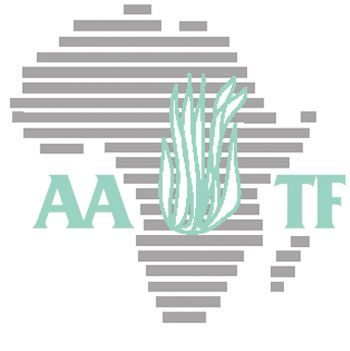
|
|
|
AFRICAN
AGRICULTURAL TECHNOLOGY FOUNDATION The AATF
Mission To link needs of
resource-poor, smallholder farmers in sub-Saharan
Africa with potential technological solutions
through: Identifying and
facilitating royalty free transfers of proprietary
technologies through negotiation Entering into
contractual agreements with existing institutions
that will manage deployment of the
technologies Ensuring that
subsequent constraints after access are
addressed UNIDO DG ROUTES FOR
BIOTECH, BIOFUELS IN AFRICA The Director
General of the United Nations Industrial
Development Organization (UNIDO), Dr Kandeh
Yumkellah, has called on African scientists and
leaders to make Africa a world leader in biofuels
production. Speaking in Nairobi
Monday, February 5 during the monthly Open Forum
for Agricultural Biotechnology (OFAB 4) initiated
by the African Agricultural Technology Foundation
(AATF), Dr Yumkellah, said Africa had the greatest
potential to supply the world with biofuels but
that it would only be able to do so if right
policies are put in place and scientists given
adequate support to conduct research. He said it would be
sad for scientists in Africa, including those
serving under the CGIAR on the continent, just to
sit back only for them to come back 15 years later
to conduct retrogressive research on how and why
Africa lost again in the on-going agricultural
biotechnology and biofuels revolutions. The DG said Africa
could produce enough cassava, palm oil, sugar cane,
maize, among other crops and trees to produce
biofuels for the continent and for export. However,
he said that for an agricultural revolution there
would have to be formed strong public and private
partnerships to marshal new technologies and
investments. He
promised UNIDO support and asked AATF through its
Executive Director, Dr Mpoko Bokanga, to help rally
African farmers, scientists and leaders for a
sustainable agricultural revolution so that the
continent can be food secure and also produce
surplus for biofuels' generation.
For more information
contact the African Agricultural Technology
Foundation ate-mail: aatf@aatf-africa.org WEBSITE:
http://www.aatf-africa.org/mission.php
AFRICA: New era of
biodiversity access begins 16th October, 2005
&endash; Rome, Italy World leaders in
agricultural research today signed agreements that
guarantee long term access to some of the world's
most important collections of agricultural
biodiversity at the same time as requiring
commercial users to share benefits with the global
community. In a ceremony timed
to take place on World Food Day &endash; with its
theme of Investing in Agriculture for Food Security
&endash; 11 centres of the Consultative Group on
International Agricultural Research (CGIAR) will
place all their ex-situ genebank collections under
the International Treaty on Plant Genetic Resources
for Food and Agriculture, now ratified by 105
countries. "This really is an
investment in food security," said Emile Frison,
Director General of IPGRI, which is responsible for
the world's banana collection. "The genetic
diversity created in the past by farmers and
researchers is the foundation of improvements to
meet the challenges of the future." "Unless we can meet
those challenges," Frison added, "there will be no
food security." The Centres of the CGIAR hold more
than 600,000 samples of crop-plant diversity. This
includes wild relatives and more than half of the
global total of farmer-created varieties, which are
such a rich source of sought-after characteristics,
for example to meet the challenge of climate
change.. Mahmoud Solh,
Director General of the International Centre for
Agricultural Research in the Dry Areas (ICARDA),
also in Rome for the signing, said that the new
agreements would "allow breeders and other
researchers to tap the collections for solutions to
the most pressing problems, such as drought,
desertification, and food and nutritional
security." Centre directors
"warmly welcome" the agreements and "commit
themselves to supporting and implementing the
Treaty". A statement issued by the Alliance of
CGIAR Centres sets out the Centres' common
understanding of certain provisions of the
Agreements and indicates some actions that the
Centres will be taking to implement
them.//.. |
||||


